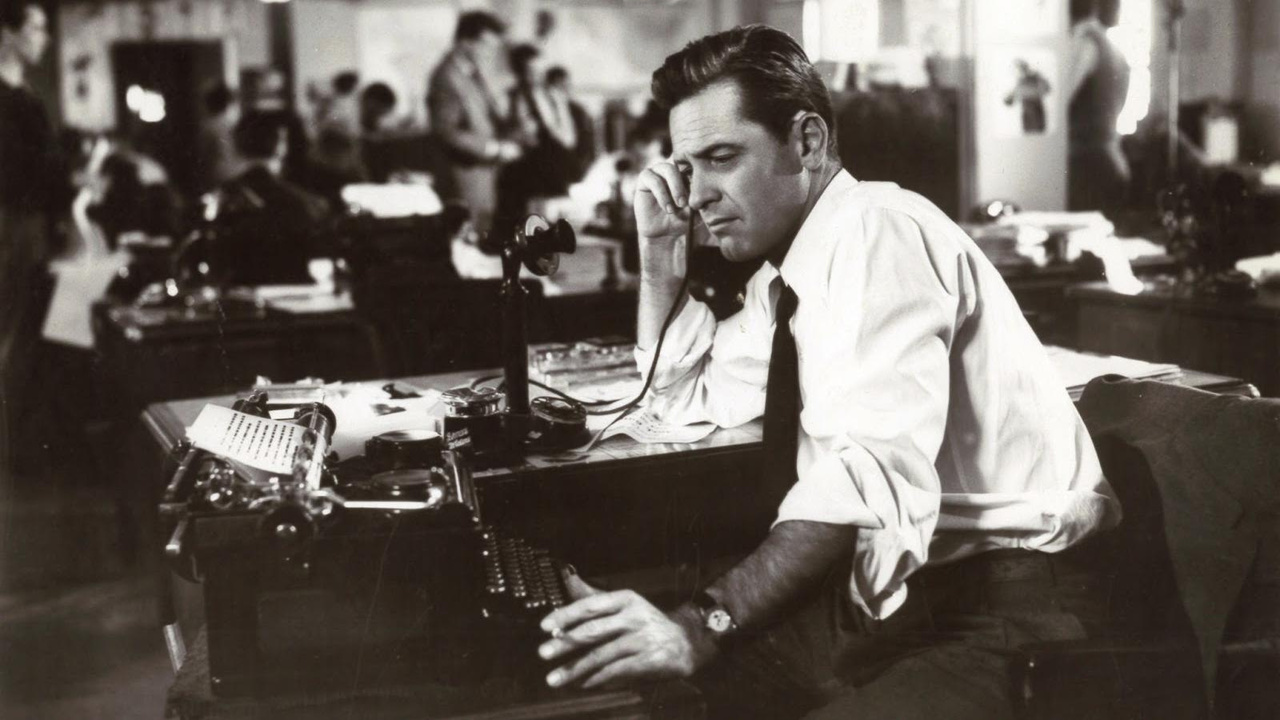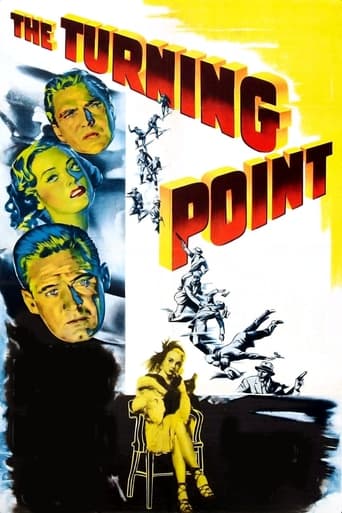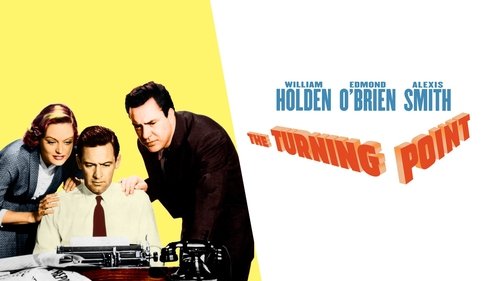




everything you have heard about this movie is true.
View MoreA Major Disappointment
if their story seems completely bonkers, almost like a feverish work of fiction, you ain't heard nothing yet.
View MoreThe film's masterful storytelling did its job. The message was clear. No need to overdo.
View MoreCopyright 1 November 1952 by Paramount Pictures Corp. New York opening at the Globe: 15 November 1952. U.S. release: November 1952. U.K. release: 1 December 1952. Australian release: 21 November 1952. Sydney opening at the Prince Edward: 21 November 1952 (ran 3 weeks). 7,797 feet. 86 minutes.SYNOPSIS: John Conroy, an honest, aggressive lawyer and politician, is head of a special committee investigating organized crime in a large Midwestern city. His friend, investigative reporter Jerry McKibbon, is shocked to discover that Conroy's father, Matt, was once a policeman on the syndicate payroll; but McKibbon decides not to tell Conroy about his father. As the committee puts pressure on the syndicate chieftain, Eichelberger, the gangsters decide that Matt Conroy must be killed.NOTES: Although the film was only moderately successful in America and England, it proved to have an astonishing second wind in Australia which made it one of Paramount's top money-earners of the 1950s. The initial Sydney season at the plush Prince Edward cinema had to be pulled for the pre-set engagement of The Greatest Show On Earth. On move-over to the downtown Lyric, a second release grind house, the film attracted such consistent turnaway business, it became Paramount's best sleeper of the decade, being constantly revived and re-circulated. Prints of the film were never idle and even the front-of-house lobby card posters eventually wore out. The Lyric itself re-presented the film "by popular demand" no less than seven or eight times.COMMENT: "Turning Point" is a crime drama that was totally under-rated by half-asleep professional critics (except in Australia). Written by Warren Duff and Horace McCoy, it was photographed and directed in an imaginative film noir style that made most effective use of its natural urban locations (in Los Angeles). Realistic sound is used to augment some tingling action sequences, handled with superb control of crowds and effects. In some ways, the story parallels The Enforcer (1951), but Dieterle's direction is beholden to no-one. Although it does use the real backgrounds beloved of the semi-documentary film-makers, this is no mere reportage approach. Dieterle has directed not only with style, polish and finesse, but at a crackling pace.Oddly, the script has many subtleties which censors didn't notice at the time (although wide-awake audiences did, which would partly account for the film's tremendous popularity, particular;y in Australia): Holden staying the night in Smith's apartment, for example; but even more startlingly, the explicit identification of the crime czar (surely the most vicious ever to appear on celluloid) as Jewish (his name is Eichelberger, and he gets most of his income from usurious money-lending) and of his heroic opponent as a Gentile (at one stage our hero even pointedly asks for a ham sandwich).The principals turn in most believable and arresting performances which just manage to keep a few tenuous steps ahead of the extremely able support cast led by Tom Tully, Ed Begley and as thuggy a group of gangsters as any film noir fan could wish: Don Porter, Ted De Corsia, Neville Brand. An exceptional cameo cast includes Ralph Sanford as the Detroit contact in the pool-room, Howard Freeman, Ray Teal, Carolyn Jones and Jay Adler.
View MoreTHE TURNING POINT – 1952 I've been looking for this one for quite some time. I managed to dig up a watchable print and the wait was well worth it. The film is headlined by William Holden, Edmond O'Brien, Ed Begley and Alexis Smith. It features a crackling good screenplay by Warren Duff, taken from the book by Horace McCoy.A government commission comes to town to look into mob activities. The main focus of the investigation is local mob boss, Ed Begley. In charge of the commission is Edmond O'Brien. His aide is Alexis Smith. William Holden plays the big city newsman who thinks the commission is really a waste of time and money. He is also a long-time friend of O'Brien.O'Brien dives in trying to get the goods on mobster Begley and his main henchmen, Ted de Corsia and Danny Dayton. Someone keeps tipping off the mob to what O'Brien and the Police are up to. O'Brien's chief investigator happens to be his father, Police Detective, Tom Tully. The problem here is that Tully is also on Begley's payroll.Newspaperman Holden knows about Tully being on the take and confronts him on the matter. Holden gives him time to switch teams, or he will need to tell O'Brien about what his father really is. Tully decides to do the right thing and inform on the mob. The mob quickly figures this out and sets up a hit on Tully. They have a low level thug, Tony Barr ambush Tully and kill him. The mob then bumps off Barr to tie off any loose ends.This does not sit well with Holden who now throws in with O'Brien to help. He writes a series of attack articles highlighting the mob types' criminal activity. Needless to say the mob is not in the least amused. They call in an out of town hit-man, Neville Brand, to deal with Holden.There is a well-staged shoot out at a local boxing arena with Holden and Brand both getting the big adiós. By now witnesses have started to pop up against the mob. The whole house of cards comes crashing down with Begley and his bunch going for a long holiday on the State's dime.The entire cast and crew shine in this excellent production. One time Oscar nominated director, William Dieterle does good work on this one. He keeps a firm hand on notorious scene stealer's like de Corsia and O'Brien, not letting them go too far over the top. His other film noir include, DARK CITY, ROPE OF SAND and THE ACCUSED.Three time nominated, and one time Oscar winner, Lionel Lindon, handles the cinematography duties. His film work includes, THE BLUE DAHLIA, ALIAS NICK BEAL, QUICKSAND, THE SUN SETS AT DAWN, HELL'S ISLAND, THE BIG CAPER and the SCARLET HOUR.Look close and you will see Russell Johnson and Carolyn Jones in early unbilled roles.The screenplay was by noir veteran, Warren Duff. He did the story or screenplays for, THE FALLEN SPARROW, CHICAGO DEADLINE, A DANGEROUS PROFESSION, APPOINTMENT WITH DANGER and MAKE HASTE TO LIVE.This film features some of the best use of Los Angeles' Bunker Hill area I've seen in any production. I really love seeing these long gone areas of the City of Angels.
View MoreRobert Wise's "the captive city" was released the same year and it's roughly the same subject .William Dieterle's work is not as absorbing because his directing is too static and academic in spite of a good cast.Melodramatic elements interfere with the film noir treatment -the father trying to redeem himself after behaving very bad,but he did it in order to pay his son 's studies etc etc -.Fortunately,the last sequence avoids pathos .Wise's film was more interesting because the enemy was almost invisible and the stranglehold it had on the town was complete though.In Dieterle's movie ,in spite of a lot of violence,we never really feel a threatening atmosphere.
View MoreWilliam Dieterle's resume shows him to be a solid craftsman only occasionally rising to true distinction. Same can be said of The Turning Point, an often routine noir about a government committee -- this was the era of the televised Kefauver hearings -- investigating mob activity and corruption in a "midwestern" city (though one scene is shot on Los Angeles' funicular railway). Routine also are cynical journalist William Holden and chief investigator Edmond O'Brien, though we're lucky to have the seldom-seen Alexis Smith as a woman attracted to them both. But the best thing in the movie is Ed Begley as the owner of a trucking company who is of course the hoodlum in chief, despite his panelled office and tailored suits. He's memorably slick and squirmy in front of the committee. But his best moment comes when he confides to a henchman his plans to burn down the tenement building where his records are stored: "You don't believe I'd do it?" he jokes. "I don't think a jury would believe it either." The following conflagration is as brutal a plot development as can be found in film noir, with firetrucks, ambulances and bodybags aplenty. It's a scene that sticks with you long after the screenplay's romantic triangle has faded from memory.
View More